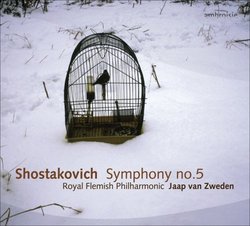| All Artists: Shostakovich, Van Zweden, Royal Flemish Philharmonic Title: Shostakovich: Symphony No. 5 Members Wishing: 0 Total Copies: 0 Label: Naive Original Release Date: 1/1/2008 Re-Release Date: 1/27/2009 Genre: Classical Styles: Historical Periods, Modern, 20th, & 21st Century, Symphonies Number of Discs: 1 SwapaCD Credits: 1 UPC: 822186001714 |
Search - Shostakovich, Van Zweden, Royal Flemish Philharmonic :: Shostakovich: Symphony No. 5
 | Shostakovich, Van Zweden, Royal Flemish Philharmonic Shostakovich: Symphony No. 5 Genre: Classical |
Larger Image |
CD DetailsSimilar CDs
|
CD ReviewsRoyal Flemish PO, Jaap van Zweden, Shostakovich Sym 5: A sur Dan Fee | Berkeley, CA USA | 03/27/2009 (5 out of 5 stars) "If you ask listeners who are shopping for recordings of the Shostakovich Fifth Symphony - chances are, nobody would be very likely to mention this youngish Dutch conductor (Jaap van Zweden, former concertmaster of the Amsterdam Concertgebouw, appointed controversially as co-concertmaster while still a teen violinist right out of conservatory), or the Royal Flemish Philharmonic in Antwerp, Belgium.
Even putting the two together does not guarantee that spark of delayed recognition which ends up with somebody thinking, Oh yes of course, now that I think about it for a moment. Each department of the RFPO is strong and musically committed. No dead wood anywhere among the players, as a New York acquaintance once remarked when asked how the Big Apple tended to react to the constant stream of regional orchestras, chamber music groups, and unknown soloists taking on the city concert halls in perpetual attempts to make it big time. These RFPO strings are lean and athletic, not fat and plush and upholstered. That lean and muscular string sound befits their entirely wide-awake, youthful sounding vigor. Nobody in the string sections is off ensemble - and Shostakovich serves up some very tricky passages that will challenge all the players' coordination. This reading more than most, highlights contrasting chamber music-like sections which many typical big band readings gloss over or sweep aside in their overt rush to big band brilliance and big band heft in the Shostakovich symphonies. Woodwinds are all as reedy-woody or breathy-aloft as the symphonic moment may be. Intonation and phrasing draw utterly and intently upon their sheer physical, as well as their varied musical, essences. Whether throwing off sparkling upper, silvery lights or adding growly, uneasy fill to Shostakovich's secret discontent with Stalinist daily and artistic life - nothing weak or bad can be laid at the feet of the band's expert woodwind players. Singly and together, the woodwinds of RFPO shine, technically and musically. The surprise is the float and the shine they duly serve to bring out in this symphony, which more often collapses into sweep, drama, and a certain grim seriousness of dissent as inevitable musical prelude to a heroic triumph at the end. This composer in this work is more complicated than that rising musical trajectory, however. Everybody in the band departments plays as if he or she knows the irresistible shine and lure of life, even while coping with very dire circumstances, injustice, and loss faultlessly imposed by injustice. The RFPO brass are also very fine. When they toot and bray, their tonal sheen is never less than commanding. This brass playing also frequently connotes a certain modernist edge, a cutting, passing visual glance of unclouded bright sunlight off one of those colossal steel and glass behemoths that prosperous world cities erect to announce business, power, and wealth. In filler and in softer moments, the brass sound no less excellent. Now, grounding the lower reaches of the woodwinds; now, pointing the phrased emphasis of the composer's sharpened, angular melodies and sharpened, angular harmonies. Jaap van Zweden reaches new, stronger, more gripping levels of musical interpretation. He now leads a fierce and compelling Shostakovich reading, still yet finely graded in terraced levels, polyphony and musical statement. His opening is strong enough to immediately get our attention, Heads Up. Yet he leaves enough room in the aptly vigorous phrasing and opening oscillation that the motif can appear again and re-appear, its message changing and growing in profoundly ambivalent perspectives as meanings emerge in different musical contexts. If some modern novels can be said to revolve around the anti-hero, then, surely this Shostakovich symphony must be said to revolve around the transient, telling failures of western classical sonata form as a positive-balanced humanist narrative - Not always musically idealized (real and true and reasonable and triumphant), among all people, everywhere, no matter what. Our spontaneous, natural human right may connote the given potentials of our becoming free people and civilized; yet what passes for much in our iterated and reiterated rounds of so-called civilization turns out, upon later intelligent rational reflection in a later century, to have been not much more than another mean round of unfair force and mis-use, by some, of the rest. Is this knowing refusal of the conductor and the band? - their not reaching in this reading for that very last Technicolor Panoramic ounce of typical western heroism as the symphony unfolds? -A musical fault of which we must complain? I think not, yet I still feel the touches of dis-ease left lingering with me after the last notes have died out in my listening room. This reading in no ways plays fast or loose with the composer's refusal to tie up all the injustice or loss or struggle, in a neat, tidy, unambiguously triumphant musical package that lauds an unambivalent western, heroic sonata-form by the end of his opus. Indeed, this reading seems to have aimed for a very different, UN-heroic end - from its first compelling notes. By refusing to gloss over the undercurrents of musical ambivalence, this recording reaches towards a triumph of a very different sort - most modern in its unflinching determination to look, clearly, at complications of tradition and change, honestly ambivalent. Listeners who need for the symphony to end entirely in heroics, all positive, must look elsewhere. This reading is powerful, just because it refuses to obscure our terrible awareness that Joe Stalin is still sitting in our audiences (still ordering his secret police to knock on our doors at three in the morning). Some fans will probably be disappointed. They may like or want to like this reading for its many fine qualities; but at last some people must fail to play this disc, again and again and again as a favorite. It is too tainted, Joe Stalin and all that, asking as it were: What have you lived from surviving under Joe Stalin? Highly recommended, this disc. But be warned: It is not for the rose-glasses-wearing faint of heart who simply must have happy endings, no matter what. Russian Disney heroes and heroines simply do not live, Happily Ever After. This Shostakovich Fifth is not, an aphorism of heroic happiness written in gilt letters and waving proudly on all the banners of certain Politically Committed public squares. Some other message more difficult, written aptly in an oblique musical and human code, its musical letters gone all terrible at moments with with sharp angles, is this Fifth Symphony by Jaap van Zweden and RFPO. This other sort of musical truth may be this disc's claim to a space some fav shelves, though hardly all. Nevertheless. This reading has qualities which would bode very well for all fifteen Shostakovich symphonies, if only this conductor and these players could bear to keep it all up, so high and so ambivalent and so unstintingly true to Shostakovich. Highly recommended. The orchestra site says a series of symphonies by Shostakovich may be recorded. If so, this cycle could end up being one of the best and most consistent." |




